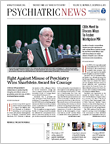APOE*E4 May Increase Risk of Late-Life Depression
People who carry the E4 variant of the apolipoprotein gene (APOE) are known to be at a greater risk of developing Alzheimer’s disease later in life, but a new population study from the University of Gothenburg in Sweden suggests this variant may also increase an individual’s risk of late-life depression. The work was published in Biological Psychiatry.
“Late-life depression is an under-appreciated source of distress and disability in older people,” John Krystal, M.D., the editor of Biological Psychiatry, said in a press release. “The current study suggests a new link to the biology of Alzheimer’s disease, even among people who do not show signs of memory impairment.”
From 2000 to 2001, 839 women and men (aged 70 to 92 years) without symptoms of dementia and depression underwent neuropsychiatric and neuropsychological evaluations; similar evaluations were repeated in 2005 and 2009.
To avoid the potential confounding effect of Alzheimer’s, which is also associated with depression risk, the research group excluded any person who developed dementia during the follow-up period. Even with this group excluded from the analysis, the presence of APOE*E4 was still found to be associated with depression (odds ratio = 1.75) and more severe depressive symptoms (odds ratio = 1.56).
Skoog I, Waern M, Duberstein P, et al. A 9-Year Prospective Population-Based Study on the Association Between the APOE*E4 Allele and Late-Life Depression in Sweden.
Biol Psychiatry. Nov 15, 2015;78(10):730-736.
Expressive Writing Could Benefit Returning Veterans
A study of 1,292 returning veterans found that expressive writing could help reduce anger, distress, and physical complaints compared with veterans who had engaged only in factual writing or those who did no writing at all. Writing also helped to reduce posttraumatic stress disorder (PTSD) symptoms.
The veterans in the two writing groups visited a website where they were instructed to write for at least 20 minutes on four occasions within a 10-day window. The expressive writing topic was on the transition from soldier to civilian; participants were asked to share their deepest thoughts and feelings. The researchers assessed the veterans’ health three and six months later.
Nina Sayer, Ph.D., deputy director of the Center for Chronic Disease Outcomes Research at the Minneapolis VA Health System, and colleagues noted that while the improvements from writing were small, the findings suggest writing could offer some benefit to veterans, given its low cost and high accessibility.
“It could be that for some people, the experience of writing about their reintegration issues may lead them to think about trying therapy, when they hadn’t thought about doing so before,” she said in a press release.
The study appeared in the Journal of Traumatic Stress.
Sayer N, Noorbaloochi S, Frazier P, et al. Randomized, Controlled Trial of Online Expressive Writing to Address Readjustment Difficulties Among U.S. Afghanistan and Iraq War Veterans.
J Trauma Stress. Oct 2015;28(5):381-90
People With Early Signs of Psychosis Appear to Process Visual Information Differently
Current models view visual perception as a combination of both bottom-up (external sensory input) and top-down (influences from prior knowledge) processes. A deficit in these pathways may explain hallucinations and delusions.
To test this concept, researchers from Cardiff and Cambridge universities compared visual information processing in 18 people with early psychotic symptoms with 16 healthy individuals. When presented with an ambiguous image, the people with early psychosis were able to discern the image better than healthy participants, suggesting their perception shifts to favor prior knowledge instead of sensory input.
As a further analysis, the study authors presented the same image task to 40 healthy people who were characterized according to their psychosis risk. In these cases, the ability to discern the image correlated with the participants’ level of psychosis risk.
“These alterations directly relate to visual function in healthy individuals and our findings support the notion of a continuum between normality and psychotic experiences,” the study authors wrote. “The changes in information processing that we report here might be among the influences that, in concert with other factors, contribute to the emergence of major mental illnesses such as schizophrenia and affective disorders.”
This study was published in the Proceedings of the National Academy of Sciences.
Teufel C, Subramaniam N, Dobler V, et al. Shift Toward Prior Knowledge Confers a Perceptual Advantage in Early Psychosis and Psychosis-Prone Healthy Individuals.
Proc Natl Acad Sci USA. Oct 27, 2015;112(43):13401-6.
E-Cigarette Use Linked With Greater Alcohol Consumption
While researchers continue to examine the direct effects of e-cigarettes, a new study suggests that problem drinking may be a secondary effect of e-cigarette use.
The research group administered a modified Nicotine and Other Substance Interaction Expectancy Questionnaire that measures habits and expectations when smoking to two independent groups (692 and 714 people, respectively).
In both groups, the survey revealed that e-cigarette use was related to excess drinking, with e-cigarette users reporting more drinking days in total per week and a higher average of drinks per outing; the survey found the opposite to be true as well, with heavy drinkers reporting higher rates of e-cigarette use.
Respondents who used e-cigarettes also reported higher average rates of alcohol consumption when they used e-cigarettes and alcohol together, which the study authors noted is troubling given that e-cigarettes are allowed in many bars and restaurants where traditional cigarettes are banned.
“By replacing smoking with e-cigarette use, it could be that you’re at risk of continuing behaviors you don’t want to continue,” said lead author Alexandra Hershberger in a press release. “This is particularly serious for people with alcohol addiction—using e-cigarettes could make it harder to stop drinking.”
The study was published in Addictive Behaviors. ■
Hershberger A, Karyadi K, VanderVeen J, Cyders M. Combined Expectancies of Alcohol and E-Cigarette Use Relate to Higher Alcohol Use.
Addict Behav. Jan 2016;52:13-21.




